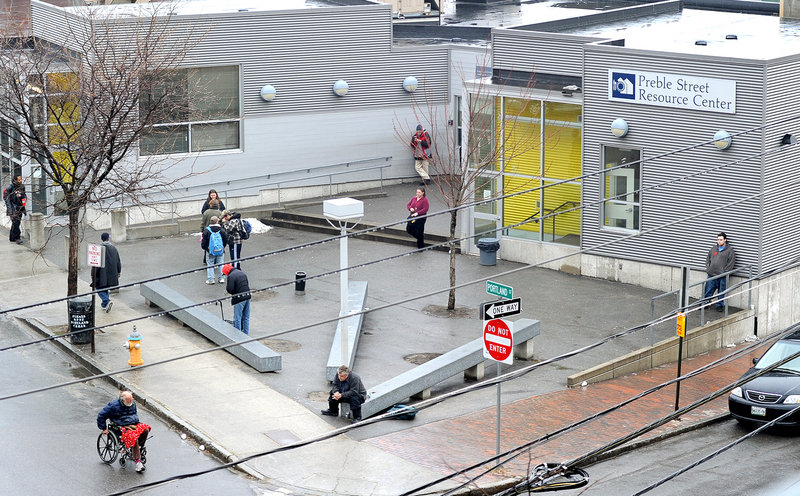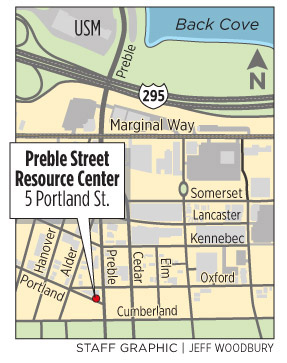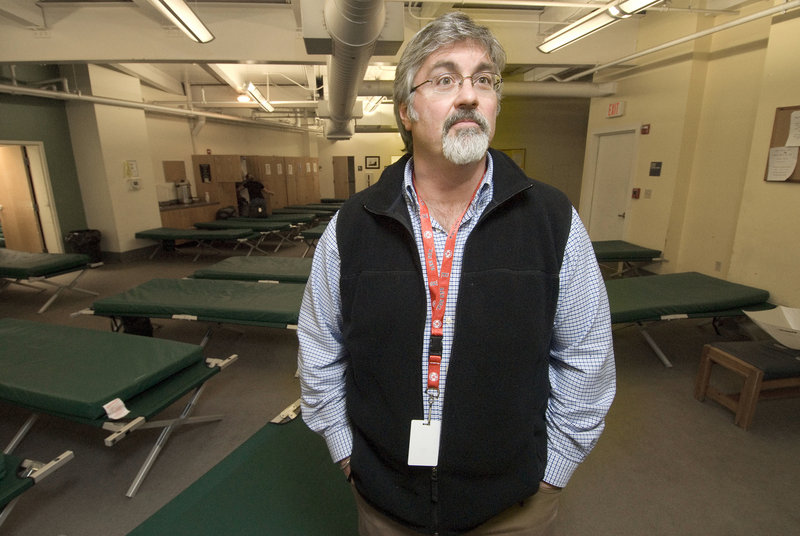PORTLAND — Police and officials at the Preble Street Resource Center will meet again today to discuss their differences over whether the social service agency’s policies have created a dangerous environment and contributed to crime in the neighborhood, as police allege.
It will be the third meeting of the two groups, who remain far apart on even basic concerns raised last month in a letter that police Cmdr. Vern Malloch sent to the City Council’s Public Safety Committee.
“Drug trafficking, fights and assaults are all too common in and around the day shelter and soup kitchen,” Malloch wrote, noting that the problems are “so serious” that officers are often posted at Preble Street’s soup kitchen.
Malloch asked the committee to get involved and require the center to establish a code of conduct for clients and “a commitment to share information with police.”
In addition to a day shelter and soup kitchen, Preble Street runs a food pantry and provides social services, primarily for the city’s homeless.
The center’s executive director, Mark Swann, said Malloch’s letter overstates the case. He said the center already has a code of conduct, and its employees work with police regularly on criminal matters.
The real sticking point, Swann said, is the police department’s request that the center maintain a list of people who get services and then give that list to police on demand.
“What we won’t do is give the police a list of all of our clients,” Swann said. To do so would jeopardize the center’s funding and violate social workers’ code of ethics, officials said.
City Councilor Edward Suslovic, who chairs the Public Safety Committee, said the crime in the area must be addressed, and the talks between police and Preble Street are “a good place to start.”
Last year there were 10,841 calls for police service in the Bayside area, the busiest beat in the city. Bayside had 540 more calls than the second-busiest police beat, the Old Port. There were 1,333 crimes reported in Bayside, the most in the city.
“The status quo is unacceptable,” Suslovic said. “The real goal is to lessen the negative impacts on the surrounding area.”
Police believe that much of the crime in the area is linked to Preble Street’s clients, said Assistant Police Chief Michael Sauschuck.
Representatives of the Bayside Neighborhood Association could not be reached for comment Tuesday.
Ron Greenberg, spokesman for PowerPay, on Cumberland Avenue near Preble Street, said the company and its employees haven’t had any problems with crime.
Swann said the center’s staff works with police by pointing out anyone who is wanted for anything more serious than “nuisance crimes,” such as loitering or public intoxication.
Police Chief James Craig said Tuesday that is not the case.
“There’s been a policy in place that we cannot go into the resource center and ask if a person is there,” he said.
Craig said the agency calls police when there are problems, like when it reported that a person suspected of dealing drugs at the center was there. But Craig said Preble Street officials had no idea that the drug dealing was happening before police informed them.
Preble Street officials have “a low-barrier (to services) philosophy that we believe has been ineffective,” he said.
Craig said that, recently, one person choked another outside the center. The man was arrested — and several officers were injured in making the arrest — but the man was reportedly back in the center a few days after being released, he said.
“If a person has engaged in criminal behavior, we believe there should be some kind of sanction,” Craig said.
Swann said the center has rules against drinking, using drugs, becoming violent or using hate speech, although he said the rules aren’t posted in the center.
He said there’s an escalating series of sanctions, from a request that the person stay away from the soup kitchen and “avoid” the center, to a longer-term suspension of services, a formal trespass order and a protection-from-harassment order.
But he said the center will not start requiring people who use the soup kitchen or food pantry to sign in, then regularly turn over the lists to police for “a fishing expedition.”
“(Clients) come in here because they’re hungry,” said Jon Bradley, assistant director of the center. “We’re not turning a list of those people over to police.”
Craig said he doesn’t believe there’s a right to confidentiality between clients and social workers, as Preble Street says.
But the center’s lawyer, Toby Dilworth, said the contract between Preble Street and the state Department of Health and Human Services requires confidentiality, and breaking it would threaten $800,000 in state funding.
“It’s one public agency telling them to do one thing and another public agency saying it would violate the contracts,” said Dilworth.
He said the social workers’ code of ethics also requires confidentiality, and breaking it could expose the workers to lawsuits.
Craig said other shelters in Portland maintain sign-in lists and turn them in to police.
The Hope Haven Gospel Mission in Lewiston, which provides a shelter, a soup kitchen and some drug and alcohol rehabilitation services, will “cooperate if the police come in here looking for an individual,” said John Robbins, the assistant director. “We have no interest in harboring criminals.”
However, Robbins said, he would respond only to a specific police inquiry, rather than turn over a whole sign-in list, unless police had a warrant.
Both Craig and Swann said they are hopeful that an agreement that helps police address crime in the area can be reached.
Staff Writer Edward D. Murphy can be contacted at 791-6465 or at: emurphy@pressherald.com
Send questions/comments to the editors.






Comments are no longer available on this story